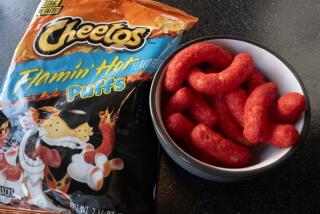In court, a trademark battle turns personal for two fish sauce makers
- Share via
Bottles upon bottles of fish sauce were slapped with blue evidence stickers and arrayed before the jury.
Inside each was a pungent, amber elixir that is to Vietnamese cuisine what olive oil is to Italian cooking, with a smell that has been likened to armpits, regurgitated cat food and liquid death.
In the downtown Los Angeles court, the lids remained tightly sealed.
The jury would be evaluating only what was on the outside — the logos of two sellers of fish sauce who usually compete on grocery store shelves rather than inside a courtroom. At stake was a slice of a market in which hundreds of millions of gallons are sold to consumers annually worldwide.
Last week’s federal trademark trial between the two fish sauce companies pitted a family-owned, three-decade behemoth in the Asian food industry that sells five lines of fish sauce against a newcomer that prides itself on making a premium, artisan version that has become the darling of celebrity chefs.
The testimony ventured beyond the legal technicalities of trademark law into the personal stories behind the making of the odoriferous sauce.
Dai Yau, president of the well-established 34-year-old company, spoke of its long history dating to the days of the company’s founding and her family’s harrowing escape from war-torn Vietnam. Cuong Pham, founder of the fledgling underdog, told jurors that fish sauce remains the taste of his childhood, conjuring memories of friends flocking to his home for his mother’s cooking.
Yau’s company accused Pham’s of trying to take advantage of her firm’s long-established logo of a red junk, an Asian sailing vessel. Pham’s premium fish sauce, which commands many times the price of sauces sold by Yau’s company, is called Red Boat and prominently features a red junk as its logo.
Fish sauce — used to season various dishes, including dipping sauces, soup and meat — is having its moment in the culinary world. It has recently made its way beyond Asian households onto cooking shows, Bon Appetit’s list of pantry essentials and tables at Michelin star-rated restaurants. Last year, the European Union started recognizing fish sauce from the Vietnamese island of Phu Quoc as a “Protected Designation of Origin,” along the lines of Champagne for sparkling wine or Parmigiano-Reggiano for hard Italian cheese.
“It’s huge,” said Nguyen Tran, the restaurateur behind the popular eatery Starry Kitchen. “It’s everywhere, and it’s non-Asians using it and asking about it.”
Yau’s firm “started out with very little,” the company’s attorney, Jeffrey Kobulnick, told jurors last week. “Fish sauce was there from the beginning.”
On the witness stand, Yau recounted how her family left Vietnam in 1975 on boats so small they could not all fit in one together. They landed in Thailand and then made their way to the U.S. In Southern California, her father, Henry Ly, saw an opportunity in the surging number of immigrants from Vietnam, Laos and Cambodia and the paucity of Southeast Asian food ingredients. He founded his company, Anhing, in 1980.
As the firm’s emblem, he chose a junk with the letter A in its sail.
“He remembered the experience of when we escaped Vietnam,” Yau told jurors. “Asians also say when business is going smoothly, it’s sailing like a junk ship.”
In the company’s early days, Yau juggled her studies in nursing school with work as her father’s translator and secretary. The family built up the business by going from store to store with photo albums of its products, a method her father and his sales force used to communicate with Asian grocers who didn’t speak Vietnamese.
Over the years, the company, based in L.A.’s Lincoln Heights neighborhood, grew to include about 3,000 products in its catalog, the junk trademark emblazoned on everything from fruit jelly to processed duck eggs sold in all 50 states and parts of South America. Yau became the firm’s president after her father retired.
Then Pham’s fish sauce arrived.
Pham founded his company, Viet Phu, in Milpitas, Calif., in 2011. By then, as one witness put it, there was a “sea of fish sauces” in Asian grocery stores. Yet none lived up to what Pham remembered from his childhood, the flavor of the sauce his uncle regularly sent from Phu Quoc island. Many sauces in the U.S. were manufactured in Thailand, despite some using the name Phu Quoc.
Like Yau, Pham arrived in the U.S. as a child from Vietnam. For more than three decades, he worked as a systems architect in Silicon Valley’s tech industry for companies like Apple and Oracle. Each time he went back to Vietnam and tasted local fish sauce, he dreamed of bringing to the U.S. the flavor he and his family missed.
He eventually created what he calls “first press extra virgin” sauce, made in Phu Quoc using only sea salt and black anchovies and fermented in barrels for a year. He named it Red Boat to emphasize the role of the fishermen who salt the fish on their boats immediately after they are caught, and to evoke the widely held belief in Asia that the color red is auspicious.
It was challenging to get onto the already crowded store shelves, he said in an interview. So he took what he’d learned from the tech industry about drumming up grass-roots interest in a new product and applied it to fish sauce. He hired a food marketing firm and a designer to come up with the look of the bottles, and started sending samples to famous chefs and industry influencers. In time, the sauce was being mentioned on the “Today Show” and in numerous publications. Grocery store buyers who’d initially ignored him started asking about the product.
One of them was Jackie Lin, a buyer for a large San Gabriel grocery store. Mistakenly thinking Yau’s company was behind the Red Boat sauce, he picked up the phone and called his Anhing sales contact to place an order, he testified during the trial.
Anhing’s attorney’s cited Lin’s confusion as clear evidence that the newcomer was infringing on the company’s longtime trademark. The sailing vessel pictured on Pham’s bottles was “way too close for comfort” with the same white lines on two red sails, Anhing’s attorneys argued.
Attorneys for Pham’s company countered that Anhing’s mark was far from iconic. They noted that Anhing uses the logo in various other colors in addition to red, including in gold on a long-running television commercial, and often with the brand name “Caravelle,” a French word for sailing boat. Fish sauce isn’t even one of Anhing’s best-selling or primary products, they contended.
“This mark is not the end-all, be-all mark that Anhing wants you to believe it is,” attorney Steven Tiller told jurors.
Moreover, the drastically different prices make confusion unlikely, he said. Anhing’s sauces sell for less than $2 a bottle; Red Boat’s bottles retail for $5 to $12, he said.
Jurors on Thursday sided with Pham’s Red Boat and its maker, finding there was no infringement. Had Anhing won, Pham’s company would have been ordered to stop using its mark and turn over the proceeds from Red Boat sales.
An attorney for Anhing said the company would appeal. Pham said he felt the case was the “big guy versus the little guy” and he was relieved to return to focusing on making good fish sauce.
“This is more than just a condiment,” he said. “It’s so good, it’s like gold.”
More to Read
Sign up for Essential California
The most important California stories and recommendations in your inbox every morning.
You may occasionally receive promotional content from the Los Angeles Times.











